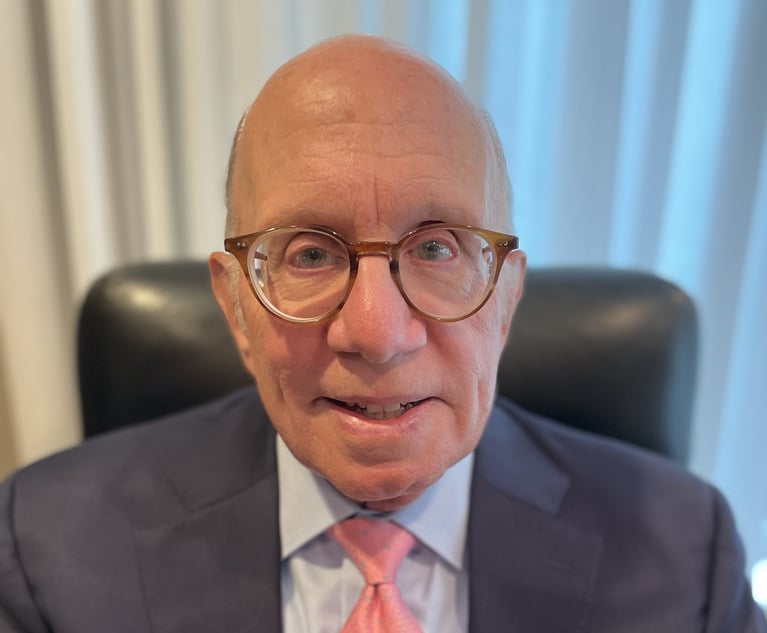Whimsical Reflections From Expert Witness 'Rocking Chairs': Part 1
This essay is a "step back" from the author's tenure in different roles at the Court of Appeals spanning the last quarter of the last century. The reminiscences recounted here, however, are from his more recent endeavors as a witness in various cases.
January 30, 2020 at 11:00 AM
8 minute read

This is part one of a four-part article describing experiences from "the other side of the bench."
Life in turbulent times is more tolerable when softened through whimsical twinkling eyes taking a look back. In that spirit, this exertion is a "step back" from my tenure in different roles at the Court of Appeals spanning the last quarter of the last century (1975 to 2000). The reminiscences, however, are principally of more recent vintage (2005-2017) that emanate after my judicial and academic careers. During the "retirement" stage from affiliated postings, I accepted a few engagements that landed me in witness chairs.
The stage for this essay is set back at an oral argument query in my inaugural year on the bench (1987), when I uttered this phrase: "Step Back, Counsel, …" He took me literally, and before I uttered another word, he let go of the lectern, backtracking a few steps while still facing the Bench. This uncompleted start was intended to lead the lawyer into a figurative exploration of where his theory might precedentially lead. The awkward moment ended when then-Chief Judge Sol Wachtler gestured for the lawyer to return to the lectern, with a saving grace: "Pay no attention to Judge Bellacosa, the red light is not on, and you still have time left."
When the laughter subsided, no one got back to where they were before. The figurative implications of the eventual ruling that I wanted to explore were lost forever in the literal hilarity of a few whimsical (in retrospect) moments. Some months later, I ran into the lawyer at a bar association function and apologized for my ambiguous opening gambit. He gingerly replied that it was OK because he knew I was just still functioning like an erstwhile law professor, only recently turned fledgling judge!
That fun anecdote remains a serious guide even now on how to frame a precise question, appropriate to a given situation. The lesson serves as the springboard for the theme of these recollections about circumstances when I was on the receiving end of some questionable utterances that boomeranged on barristers and lawyers probing me in witness seats below benches.
To provide a temporal context, I had retired from the Court of Appeals in 2000 to return to St. John's University School of Law as Dean and Professor. There, I acquired another post-judicial humility lesson. In academe, I never heard a variation on the familiar phrase "May it please Your Deanship!" The venerable deference was wholly behind me—not unlike the attitude I later encountered sitting in witness chairs in a variety of forums. The various lawyers and barristers, while exhibiting restrained respect, were not intoxicated with the fumes of my career highlights. Their professional goal was to knock down the content of my expert reports, and my reliability to boot if necessary, no matter how many vestigial titles were layered into my resume.
Anyway, after 25 years at the Court of Appeals and a four-year transitional stint back in academe at my alma mater, I moved on to this new career—a post-affiliation "retirement" phase for about a dozen years. It consisted of freelance selective New York law expert "gigs" and some interesting arbitration panels. My plan and intention were to emulate Cicero's serene description on his retirement from the Roman Senate—"La Bella Vita Umbratilis", "The Beautiful Life in the Shade." Little did I realize—any more than Cicero—how hot these witness seats could be. I did make out better than he did, however, because no Marc Antony-like assassin came after me like the one Augustus sent to shut Cicero up for good and end his retirement in the shade of a vineyard at his villa outside Rome!
For my sweep of these witness hot-seat encounters, while squirming uneasily below the bench for the very first time, I had anticipated a more sedate experience, albeit with the highest level of professional execution. Much to my surprise, I encountered some unsophisticated gaffes, ineffective tactics, and some surprising whimsical turnabouts.
Eastern Caribbean: Tortola High Court of Justice, British Virgin Islands Commercial Division. The case in a balmy venue presented a contractual interpretation dispute, the interpretation and resolution of which was governed by New York law. This spin-off litigation was complicated by overarching questions pending in the U.S. Bankruptcy Court in New York, emanating from the massive Bernard Madoff fraud scandal centered in New York City that had long international legs and sprawling legal implications.
My New York expert law report was entered into evidence, as I took the stand, to be cross-examined almost immediately for reliability and substantive weight, not a "given" by reason of prior affiliations or accomplishments. I was told that a barrister was flown in from London specially to conduct the cross-examination. The presiding jurist sat ramrod straight, projecting a very proper British attitude with buttoned-up robe and no wig. He had been assigned to the Eastern Caribbean Court for many years, and displayed a distinguished demeanor and no-nonsense command of his tribunal.
The opening gambit of the specially engaged barrister backfired almost at once—maybe due to travel fatigue, time-zone jet lag, or last-minute too-casual preparation on the flight. She stepped towards me from her counsel table, in her flowing barrister robe, as I sat in my business suit. I was nervously poised on the witness stand in the somewhat drab windowless courtroom that bespoke nothing of the laid-back Caribbean atmosphere outside. Speaking in stride with a file in one hand as she approached me close up, she smugly uttered, poking her other hand and finger at me: "I just do not know how to address you, Sir, or what to call you, as your curriculum vitae lists so many titles – please tell me how you wish to be addressed?" Taken aback but before I could compose a reply, I was startled to hear the Trial Judge firmly interject: "You WILL refer to the witness as JUDGE BELLACOSA!"
The barrister "stepped back"—literally and figuratively stunned. She adjusted at once to a rather perfunctory canvass of the merits—or demerits as she saw them—of my expert report. I was shortly done and curtly excused, much to my surprise and delight. The long trial continued after my excusal from the witness chair and any further attendance. A series of procedural twists and turns ensued without my participation, and I was later informed that the party that had engaged me prevailed eventually back in the Bankruptcy Court in New York.
When I left the courthouse to join my wife on a lovely Caribbean beach, I thought back to the ticky-tack tactic tried out by the barrister to disarm a former judge as witness in front of a sitting jurist. It exhibited little common sense of regard for the mutuality of rank, respect, and international sense of judicial comity. Besides, even though the role I was engaged for is partisan, it simultaneously carries a certified commitment to independence under customary Rules of Procedure in trying to be of honest assistance to the tribunal. It should have been a given that the court would likely be appreciative of the aid (as the judge so expressed when I was excused), and even protective of the equivalent-rank person providing it.
One would think then that sophisticated lawyers and barristers ought to have anticipated that distinctive local collegial sense, and thus trim the more usual combative and adversarial styles of litigation. It surprised me that barristers would risk giving such an advantage to adversaries and an opportunity to a presiding officer to jump to rescue a witness. The immediate intervention of the presiding trial judge in this Caribbean setting took all the heat and edge off me, and led me to think that this barrister must also have missed the cross-examination and professional courtesy lessons at Middle Temple Inns of Court.
Many in my family and among my colleagues and friends, by the way, had the view that this assignment was a lovely plum. It was. Truth be told, though, my days of preparation and required attendance for that window-less courtroom appearance in a nondescript building on the lovely Island of Tortola was "no day at the beach!" (ouch). Oh well, no use wailing "Woe is Me," nor a "Don't cry for me, Isle of Tortola!" (Double Ouch!!). It was what it was, and it turned out to be a truly fun and sunny assignment.
Joseph W. Bellacosa is a retired judge of the New York Court of Appeals.
This content has been archived. It is available through our partners, LexisNexis® and Bloomberg Law.
To view this content, please continue to their sites.
Not a Lexis Subscriber?
Subscribe Now
Not a Bloomberg Law Subscriber?
Subscribe Now
NOT FOR REPRINT
© 2024 ALM Global, LLC, All Rights Reserved. Request academic re-use from www.copyright.com. All other uses, submit a request to [email protected]. For more information visit Asset & Logo Licensing.
You Might Like
View All
Patent Trolls Come Under Increasing Fire in Federal Courts

Why Is It Becoming More Difficult for Businesses to Mandate Arbitration of Employment Disputes?
6 minute readTrending Stories
- 1A Funny Thing Happened on the Way to Becoming Clerk of the Forum
- 2Pa. Supreme Court Taps New Philadelphia Family Division Administrative Judge
- 35th Circuit Rules Open-Source Code Is Not Property in Tornado Cash Appeal
- 4Mediators for the Southern District of New York Honored at Eighth Annual James Duane Awards
- 5The Lawyers Picked by Trump for Key Roles in His Second Term
Who Got The Work
Michael G. Bongiorno, Andrew Scott Dulberg and Elizabeth E. Driscoll from Wilmer Cutler Pickering Hale and Dorr have stepped in to represent Symbotic Inc., an A.I.-enabled technology platform that focuses on increasing supply chain efficiency, and other defendants in a pending shareholder derivative lawsuit. The case, filed Oct. 2 in Massachusetts District Court by the Brown Law Firm on behalf of Stephen Austen, accuses certain officers and directors of misleading investors in regard to Symbotic's potential for margin growth by failing to disclose that the company was not equipped to timely deploy its systems or manage expenses through project delays. The case, assigned to U.S. District Judge Nathaniel M. Gorton, is 1:24-cv-12522, Austen v. Cohen et al.
Who Got The Work
Edmund Polubinski and Marie Killmond of Davis Polk & Wardwell have entered appearances for data platform software development company MongoDB and other defendants in a pending shareholder derivative lawsuit. The action, filed Oct. 7 in New York Southern District Court by the Brown Law Firm, accuses the company's directors and/or officers of falsely expressing confidence in the company’s restructuring of its sales incentive plan and downplaying the severity of decreases in its upfront commitments. The case is 1:24-cv-07594, Roy v. Ittycheria et al.
Who Got The Work
Amy O. Bruchs and Kurt F. Ellison of Michael Best & Friedrich have entered appearances for Epic Systems Corp. in a pending employment discrimination lawsuit. The suit was filed Sept. 7 in Wisconsin Western District Court by Levine Eisberner LLC and Siri & Glimstad on behalf of a project manager who claims that he was wrongfully terminated after applying for a religious exemption to the defendant's COVID-19 vaccine mandate. The case, assigned to U.S. Magistrate Judge Anita Marie Boor, is 3:24-cv-00630, Secker, Nathan v. Epic Systems Corporation.
Who Got The Work
David X. Sullivan, Thomas J. Finn and Gregory A. Hall from McCarter & English have entered appearances for Sunrun Installation Services in a pending civil rights lawsuit. The complaint was filed Sept. 4 in Connecticut District Court by attorney Robert M. Berke on behalf of former employee George Edward Steins, who was arrested and charged with employing an unregistered home improvement salesperson. The complaint alleges that had Sunrun informed the Connecticut Department of Consumer Protection that the plaintiff's employment had ended in 2017 and that he no longer held Sunrun's home improvement contractor license, he would not have been hit with charges, which were dismissed in May 2024. The case, assigned to U.S. District Judge Jeffrey A. Meyer, is 3:24-cv-01423, Steins v. Sunrun, Inc. et al.
Who Got The Work
Greenberg Traurig shareholder Joshua L. Raskin has entered an appearance for boohoo.com UK Ltd. in a pending patent infringement lawsuit. The suit, filed Sept. 3 in Texas Eastern District Court by Rozier Hardt McDonough on behalf of Alto Dynamics, asserts five patents related to an online shopping platform. The case, assigned to U.S. District Judge Rodney Gilstrap, is 2:24-cv-00719, Alto Dynamics, LLC v. boohoo.com UK Limited.
Featured Firms
Law Offices of Gary Martin Hays & Associates, P.C.
(470) 294-1674
Law Offices of Mark E. Salomone
(857) 444-6468
Smith & Hassler
(713) 739-1250








